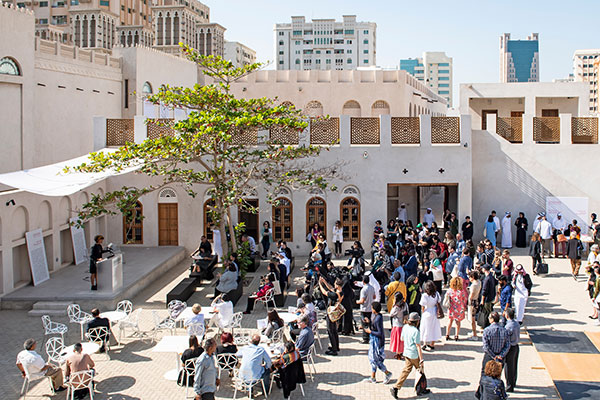The 15th annual Sharjah’s March Meeting of the Sharjah Art Foundation The Postcolonial Constellation: Art, Culture, Politics after 1960 brought together students from all over the world, curators, and artists to address important topics related to the main theme of the 15th Sharjah Biennial: Thinking Historically in the present. The Afterlives of the Postcolonial (MM 2022) and Unraveling the Present (MM 2021) were comparable meetings that were conceptualized as part of the SB15 programming in reference to a Nigerian critic. The theme takes its cue from late Nigerian art critic Okwui Enwezor’s conception of the Postcolonial Constellation exhibition. The programme of panels, talks and presentations is examining the systemic and structural shifts that have influenced the production and absorption of art worldwide since the mid-20th century.

Sharjah Art Foundation’s March Meeting is an annual convening of artists, curators and art practitioners from around the world who come together to discuss vital issues in contemporary art. Located in Sharjah’s historic Art and Heritage Areas, Sharjah Art Foundation activities and events include exhibitions featuring the work of Arab and international artists, performances, music, film screenings and artist talks as well as extensive art education programmes for children, adults and families.
Programme Notes from Sharjah Art Foundation
The Postcolonial Constellation: Art, Culture, Politics after 1960 examines the forces that have shaped the production and reception of art across the world from 1960 to the present, reconfiguring the cartographies of global modernism and contemporary art. It will offer discursive space to explore artistic, political and cultural positions traversing subalternity and self-determination, first nation and Indigenous practices, creolisation, hybridity and supranational formations, such as the Black Atlantic, diasporas, exile and statelessness. It will thus constitute a dynamic intersection of artistic, ideological and philosophical perspectives on decolonisation—a field of scholarship originally developed within postcolonial studies.
Delineating a moment in which the notion of a consolidated nation-state is challenged by the remarkable resilience of individual, non-state and counter-institutional models of sovereignty, autonomy, identity and subjectivity, The Postcolonial Constellation studies the global political, social and economic systemic and structural shifts that have characterised our world since the 1960s. It does so by revisiting and reanimating the archives and histories of this period; by examining contemporaneous artistic and political practices, theories and cultural production testifying to that time and by presenting ideas, artists, artworks and critical theory that offer parallactic views of our convulsive world.
The Postcolonial Constellation reflects on the movements and interactions of artists, filmmakers, performers, thinkers, writers, philosophers, public intellectuals, activists, guerrilla movements and other societal actors within and beyond the limiting framework of the ‘sovereign nation-state’. To the extent that The Postcolonial Constellation understands the global present as intimately tied to histories of the postcolonial, MM 2023 and the other platforms of SB15 constitute critical spaces for ‘thinking historically in the present’.
:quality(70):focal(2175x1205:2185x1215)/cloudfront-eu-central-1.images.arcpublishing.com/thenational/6CIJ7JMDLNER2FYVEF7IWV66CA.jpg)
Its History
Established in 2009, Sharjah Art Foundation (SAF) builds on the history of cultural collaboration and exchange that began with the first Sharjah Biennial in 1993.
Razmig Bedirian at The National News states that The inaugural March Meeting took place in 2008 and revolved around predictions of what the future of the regional art scene. “The second meeting took place on the sidelines of the ninth Sharjah Biennal. More than 40 institutions participated from the Arab world and beyond. Panellists discussed the production and reception of Arab art and how the global economic climate was affecting artists within the region. The March Meeting also featured a week-long intensive workshop for young curators.”
Over the following ten years, the March Meeting gradually grew to include additional elements, such as Dardashat, an informal project debate that highlights fresh cultural projects from across the world and draws in an increasing number of institutions, artists, and art professionals.
The March Meeting, now in its fifteenth year, is still a significant event in the UAE’s cultural calendar. The platform is at the forefront of international cultural conversation and crucial in challenging conventional historical narratives. Among the speakers this year are Surafel Abebe (Assistant Professor, Performance Studies and Theory, The Africa Institute); Nadi Abusaada (Postdoctoral Fellow, Institute for the History and Theory of Architecture, ETH Zürich); Mahvish Ahmad (Assistant Professor in Human Rights and Politics, London School of Economics); Esra Akcan (The Michael A. McCarthy Professor, Cornell University); Kamran Ali (Professor of Anthropology, University of Texas at Austin); Anna Arabindan-Kesson (Associate Professor of African American and Black Diasporic Art, Princeton University and Senior Research Fellow, Art Gallery of Western Australia) and many more.


